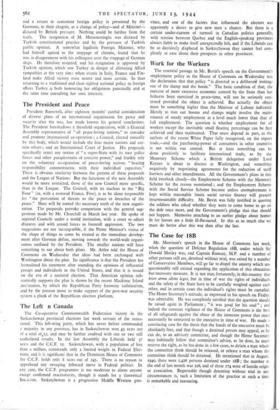The President and Peace
President Roosevelt, after eighteen months' careful consideration of diverse plans of an international organisation for peace and security after the war, has made known his general conclusions. The President foreshadows a threefold organisation, with a General Assembly representative of "all peace-loving nations," to consider and promote international co-operation ; a Council, elected annually by this body, which would include the four major nations and cer- tain others ; and an International Court of Justice. His proposals specifically reject any notion of "a super-State with its own police forces and other paraphernalia of coercive power," and frankly rely on the voluntary co-operation of peace-loving nations "bearing responsibility commensurate with their individual capacities." There is obvious similarity between the pattern of these proposals and the League of Nations. But the functions of the new Assembly would be more restricted, those of the new Council more specific, than in the League. The Council, with its nucleus in the "Big Four" (or, with a restored France, Five), is to be alone responsible for "the prevention of threats to the peace or breaches of the peace." Here will be rooted the necessary teeth of the new organi- sation. The proposals provoke comparison with the general sug- gestions made by Mr. Churchill in March last year. He spoke of regional Councils under a world institution, with a court to adjuit disputes and with armed forces to forestall aggression. The two suggestions are not incompatible, if the Prime Minister's vision of the shape of things to come be treated as the immediate develop- ment after German defeat, moving towards the world-wide organi- sation outlined by the President. The smaller nations will have something to say about both plans. Mr. Attlee told the House of Commons on Wednesday that ideas had been exchanged with Washington about the plan. Its significance is that the President has formulated his statement after sounding the opinions of influential groups and individuals in the United States, and that it is issued on the eve of a national election. That American opinion sub- stantially supports the plan is shown by the recent Mackinac Island declaration, by which the Republican Party forswore isolationism,. and by the present move to make support of the post-war security system a plank of the Republican election platform.






















 Previous page
Previous page